- Home
- Patricia MacLachlan
Waiting for the Magic
Waiting for the Magic Read online
Also by Patricia MacLachlan
Edward’s Eyes
The True Gift
ATHENEUM BOOKS FOR YOUNG READERS
An imprint of Simon & Schuster Children’s Publishing Division
1230 Avenue of the Americas, New York, New York 10020
www.simonandschuster.com
This book is a work of fiction. Any references to historical events, real people, or real locales are used fictitiously. Other names, characters, places, and incidents are products of the author’s imagination, and any resemblance to actual events or locales or persons, living or dead, is entirely coincidental.
Text copyright © 2011 by Patricia MacLachlan
Illustrations copyright © 2011 by Amy June Bates
All rights reserved, including the right of reproduction in whole or in part in any form.
ATHENEUM BOOKS FOR YOUNG READERS is a registered trademark of Simon & Schuster, Inc.
The Simon & Schuster Speakers Bureau can bring authors to your live event. For more information or to book an event, contact the Simon & Schuster Speakers Bureau at 1-866-248-3049 or visit our website at www.simonspeakers.com.
Book design by Debra Sfetsios-Conover
The text for this book is set in Centaur MT STD.
The illustrations for this book are rendered in charcoal pencil on paper.
Manufactured in the United States of America
0711 FFG
First Edition
10 9 8 7 6 5 4 3 2 1
Library of Congress Cataloging-in-Publication Data
MacLachlan, Patricia.
Waiting for the magic / Patricia MacLachlan. —1st ed.
p. cm.
Summary: When Papa goes away for a little while, his family tries to cope with the separation by adopting four dogs and a cat.
ISBN 978-1-4169-2745-7 (hardcover : alk. paper)
[1. Separation (Psychology)—Fiction. 2. Family life—Fiction. 3. Dogs—Fiction. 4. Cats—Fiction. 5. Human-animal communication—Fiction.] I. Title.
PZ7.M2225Wai 2011
[Fic]—dc22
2010019668
ISBN 978-1-4424-3125-6 (eBook)
For Emily, Dean, Nicholas, Neo, and Tess—
but especially for Sofia, who is very much in this book.
With love,
P. M.
Contents
Chapter 1
Chapter 2
Chapter 3
Chapter 4
Chapter 5
Chapter 6
Chapter 7
Chapter 8
Chapter 9
Chapter 10
Chapter 11
Chapter 12
Chapter 13
Chapter 14
Chapter 15
Chapter 16
Chapter 17
Chapter 18
Chapter 19
Chapter 20
About the Author
I don’t want realism. I want magic!
—Tennessee Williams
Here are the ones who know magic:
The young
The old
The brave
The honest
The joyful.
They are all here.
—P. M.
Waiting for the Magic
Chapter 1
IT WAS EARLY ON A SATURDAY summer morning when my mother and father stopped arguing and Papa walked away. He is a teacher of literature at the college, so he could have said words when he left. He didn’t. And this time he didn’t slam the door. He shut it with a small, soft sound that made me jump.
“Click,” said my four-year-old sister, Elinor, looking up from her coloring book. I stared at the door. I could feel my heart thump. And I could feel tears coming.
Later, when I went into my bedroom, I found two notes from Papa—one for me and one for Elinor.
Dear William,
I’ve gone off to do some writing. I will call you. And I’ll be back to see you soon. I’m sorry for this.
I love you,
Papa
I read Elinor’s note to her. It was like mine, but he had drawn a picture of Elinor in her long dress.
Elinor took the note but didn’t say anything.
Suddenly Mama was in the doorway. She beckoned to me.
“Let’s go, William,” she said. “Get your sweater, Elinor.”
I stood up and tore my letter into small pieces.
“What’s that?” Mama asked.
“Nothing,” I said. “Go where?”
I followed Mama out to the car.
She strapped Elinor into her car seat.
“We’re going to get a dog,” she said firmly.
I sat next to Mama in the front seat.
“Papa never wanted a dog,” I said.
“That’s true,” said Mama. “Your father is a flawed man. Everyone should have a dog.”
“What is ‘flawed’?” asked Elinor from the backseat.
“It means stupid,” said Mama with feeling.
“Stupid is a bad word,” Elinor announced. She pronounced “word” as wood.
“Yes,” said Mama. “He is a stupid bad wood.”
Elinor had a list of “bad woods,” forbidden by Mama who thought words like “fat” and “stupid” were cruel to call anyone.
Mama began to cry then, very quietly, so that Elinor couldn’t see. I couldn’t say anything. Mama’s crying scared me. All I could do was hate Papa for this. For causing Mama to cry right in front of me.
A driver cut off Mama, and she slammed on the brakes.
“Go to your house, lady!” yelled Elinor at the driver. “Read a book or watch a movie!”
Mama started to laugh, and so did I. Those words coming out of Elinor’s mouth; that face surrounded by messy blond hair. Words that must have been Mama’s at one time.
“What kind of dog are we getting?” I asked.
“Whatever they have,” said Mama.
“Can we get a cat?” asked Elinor from the back.
“Yes,” said Mama.
For a moment I thought about asking for a horse, but I didn’t think Mama’s mood about animals would last that long.
Mama turned into the long driveway at the animal shelter.
As we walked to the front door, Mama took my hand. “I shouldn’t have said that about your father, William,” she said.
“Will he come back?” I asked.
He had gone before and come back happily after a while as if nothing had happened.
“Probably. I’m mad at him, Will. But that doesn’t make him bad.” She paused. “Sometimes your papa doesn’t know what he wants.”
I didn’t answer Mama. He had gone before, but he had never left notes for Elinor and me. Somehow that seemed more final, that note. It was something to be read, saved, or torn up. Maybe Papa felt that leaving a note made going away all right.
Thinking about it would wait for later. In fact, when we went inside I forgot all about my father for just a little while because Mama surprised me more.
The shelter was small, and a woman with spiky hair invited us in. Her name tag said JULIA.
“I’m glad you brought your children. We don’t let families adopt dogs without the children present.”
We walked through a door to a room where the dogs were. She turned to us.
“We have four dogs right now. There is a little description and history of each dog. When you see one you’re interested in, let me know. You can spend time with him or her to see if you’re a fit. I assure you that they are all friendly. Call me when you’re ready.”
The first dog’s name was Bryn.
Mama read about Bryn.
“Bryn’s owner has gone to a nursing home and can’t take
the dog with her.”
Bryn was sturdy and brown, with a sharp nose, long velvet ears, and a line of raised hair along her back. She sat up and curled her lip at us, showing her teeth. Friendly?
“Shark,” announced Elinor.
Mama laughed.
“Hello, Bryn,” she said. “You’re a pretty girl.”
Bryn wagged her tail. Her face changed when she heard Mama’s voice.
Bitty, the next dog, was small, with a terrier face and body.
I read out loud to Elinor. “Bitty is high energy. Too much for his family.” And Bitty, as if he had heard me, jumped straight up in the air.
Elinor laughed.
In the next pen there was a greyhound, tall, standing still like a statue. Her name was Grace.
“Grace,” I told Elinor. “She is very shy but friendly. She had a life of racing, but unlike many racing greyhounds, she is gentle with small animals. She needs a home with peaceful people.”
“We are peaceful,” said Elinor.
She put her hand against the pen. Grace looked at her steadily, then walked up close and nosed Elinor’s hand.
“Grace,” said Elinor very softly.
One more dog. Big and woolly, white and gray.
“Neo is very young, even though he is so big. He will get much bigger! He is part Great Pyrenees and—”
Elinor interrupted me.
“He likes children and cats,” she said.
Neo looked at Elinor with large, kind eyes.
“How do you know that? You can’t read,” I said to Elinor.
Elinor just smiled.
Mama had been very quiet all along. She was staring at the dogs, one after the other. Julia came into the room.
“What do you think?” she asked.
Mama took a deep breath.
“Do these dogs get along with each other?” she asked.
“Yes. They play outside every day. I think Bryn is the alpha,” she added.
Mama nodded.
“That means the boss,” I told Elinor.
“Is there one dog that interests you?” asked Julia.
Mama looked at Elinor and me.
I shook my head.
“I like them all,” I said.
Elinor nodded.
“We’ll take them all,” Mama said crisply. Beside me Elinor smiled her knowing four-year-old smile. Of course we’ll take them all!
Julia’s mouth dropped open.
“But that is not done,” she said.
“Then today is a first,” said Mama cheerfully.
She took out her checkbook.
After a moment, the woman opened the doors to the dogs’ crates, and they all milled around us.
Elinor pulled on Mama’s arm. Mama leaned down, and Elinor whispered in her ear.
“Oh, yes,” said Mama. “And we want a cat, too.”
Chapter 2
SO FOUR DOGS AND A CAT named Lula replaced my father. The house was filled with different dog foods for different-age dogs, a big crate for Neo (in Mama’s words, “he can reach the kitchen counters and needs to be put away every so often”), and a litter box for Lula.
Lula was a relaxed cat. Elinor carried her around and dressed her in dresses and onesies she’d worn when she was a baby. Sometimes Elinor pushed her in a doll carriage. Lula was happy to watch the world like a newborn.
Mama kept busy with dog dishes and leashes and fleece dog beds. The house was full. But it was peaceful at the same time.
My friend Max thought it was very exciting. Not that my father was gone, but that Mama had brought home four dogs and a cat.
“No one’s mother ever does that! Ever!” said Max, staring at Mama admiringly.
“She may be insane,” I told Max.
“I don’t think so,” whispered Max very seriously.
My grandfather Will came in, waded through the dogs, and sat down on the couch.
“Hi, Janey!” he called to Mama in the kitchen.
“Hi, Dad. I’m making coffee,” she called.
“How are you?” he called.
Mama appeared in the doorway and flipped her hand back and forth, a family habit, meaning, “don’t know,” or “so-so,” or “whatever.”
“How’s Mom?” she asked.
“Knitting a blanket large enough to cover Rhode Island,” he said. “She is yarn obsessed.”
Bitty leaped up to sit next to him. Neo leaned against Grandfather and put a huge mitten paw on his lap.
“Filling up the house, is she?” he said wryly to me.
“To make up for Papa going away,” I said.
“And how’s that working for you?” he asked, knowing exactly what Mama was doing.
I was quiet. He looked at me.
“Call me if you want to talk,” he whispered. “Your father is a mystery. Mostly to himself. He is not a bad man.”
I nodded.
“That’s what Mama said.”
“But you don’t agree,” he said.
“No,” I said. “No,” I repeated louder, and Grandfather put his arm around me. It felt good. No one had put arms around me since Papa had left. Not even Mama.
Neo, the big puppy, kept watch over Lula the cat, in Elinor’s words, “keeping all bad things away from Lula.”
Grace, the greyhound, kept watch over Elinor, following her from room to room. Sometimes we found Grace standing by Elinor’s bed at night, her long face on the bedcovers, watching Elinor. Bitty claimed the window seat so he could keep watch outside. He got along with everyone. And Bryn, from the first moment she saw Mama, was Mama’s dog. She slept with Mama, stretched out where Papa used to sleep. She walked with Mama, watched Mama.
“I wish I could teach Bryn how to cook and drive,” Mama said. “She’d be a great help.”
“That would be magic,” said Elinor. “Bryn driving.”
“This is a bit of magic, isn’t it? All these very nice dogs living with people who need them?” said Mama.
Magic. It was a word I hadn’t thought of much. Never, actually.
“There is no such thing as magic,” I said.
Elinor looked at me and smiled that smile. As Mama went to the kitchen, Elinor picked up her toy wand with the gold sparkling star on the end. She waved it.
All the dogs sat up.
“Magic,” she said.
“How did you do that?!” I said to Elinor.
Elinor smiled.
The word “magic,” said in Elinor’s small voice, seemed to hang in the air above us all, like a little cloud with sun coming through. Magic. No such thing.
“I think Grace needs fresh water,” called Mama from the kitchen.
Grace leaned over close to Elinor.
“Grace wants fresh tepid water right from the faucet,” said Elinor. “Whatever tepid means,” she added.
“It’s like Elinor heard Grace talking to her,” I said to Mama in the kitchen.
Grace
Of course she heard me. She’s four. Four-year-olds hear everything. They know everything.
Bryn
They know magic is real.
Neo
Stupid grown-ups.
Bitty
Stupid is a bad word. Elinor told me.
Chapter 3
IT WAS NIGHTTIME. Papa had been gone for a week. Neo was on one side of me in bed, Bitty on the other. Big and Little. The mismatched pair had become my dogs. Bitty had all the energy, Neo the sweetness. Mama said that together they made one great dog.
“William. Will?”
It was a whisper. Elinor’s whisper. Bitty sat up.
I opened my eyes.
“What’s the matter?” I asked.
“I can’t sleep,” whispered Elinor.
“Move, Bitty,” I said.
Bitty jumped over my body to sleep with Neo.
I lifted the covers and Elinor crawled in.
I waited for a moment; then, as I’d known she would, Grace appeared by the bed like a spirit in the night.
; “All right,” I said to her.
Grace jumped up, then turned around three times, curling up next to Elinor’s knees.
“We have three dogs here,” I said.
“And Lula,” said Elinor.
I turned and saw Bitty, Neo, and Lula in a heap.
“I dreamed about Papa,” Elinor said. “He was here.”
Suddenly I felt angry, and my throat tightened. If Papa hadn’t gone, Elinor would dream about other things, things she liked to dream about. Trees and meadows. And magic.
“Was it a happy dream?” I asked her.
Elinor didn’t answer for a moment. When she did, her voice sounded far away.
“It was like every day,” she said.
“Good or bad?” I asked.
She waved her hand in the family gesture. Don’t know. Doesn’t matter. Whatever.
Elinor yawned.
“Do you miss him?” she asked in a sleepy voice.
I thought about that. I looked at the dogs and the cat, the moonlight across all that fur. I could see the rise and fall of their chests as they breathed. All those heartbeats.
“No,” I said at last. My voice was loud in the quiet house. “I don’t miss him.”
Right away I felt guilty saying it out loud, especially to Elinor. Hearing the words made everything worse. But when I looked at Elinor to say I didn’t mean it, she was asleep.
Another heartbeat.
Neo
He misses his father.
Bitty
Yes, he does.
Neo
Can you move over, Bitty?
Bitty
The cat’s there.
Neo
The cat’s name is Lula, Bitty. Lula.
Bitty
Okay, Lula.
I know you like her.
You ask her to move over.
Neo
Could you move over, Lula? Lula?
It’s not her time to speak.
Bitty
Cats! They are undependable. They only speak when they want to.
Grace
Hush! Go to sleep!
“It’s all right, Grace,” said Elinor sleepily. She reached down to touch Grace’s head.
“What?” I asked.
“Sleepy time,” said Elinor, nearly asleep again. “I was talking to Grace.”
I lifted my head to look at Elinor, then Bitty and Neo and Grace. Lula stretched and turned over.

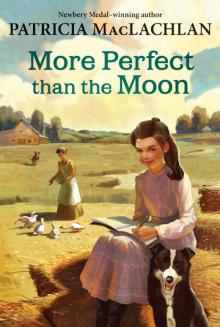 More Perfect Than the Moon
More Perfect Than the Moon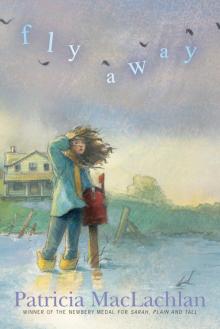 Fly Away
Fly Away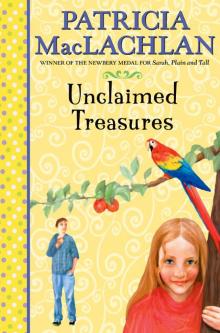 Unclaimed Treasures
Unclaimed Treasures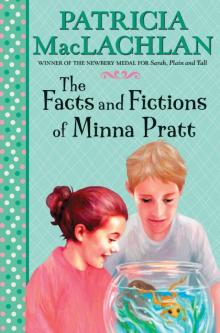 The Facts and Fictions of Minna Pratt
The Facts and Fictions of Minna Pratt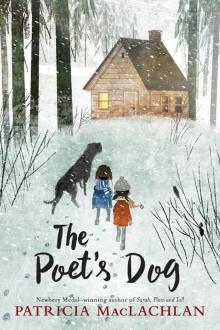 The Poet's Dog
The Poet's Dog Journey
Journey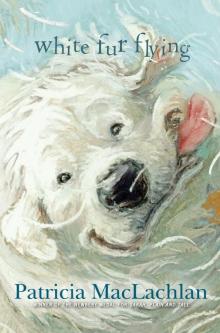 White Fur Flying
White Fur Flying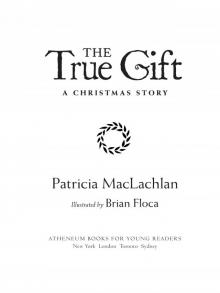 The True Gift: A Christmas Story
The True Gift: A Christmas Story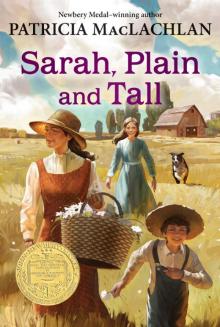 Sarah, Plain and Tall
Sarah, Plain and Tall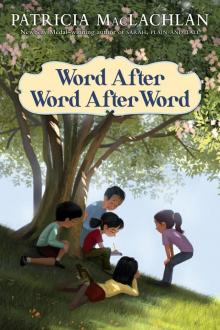 Word After Word After Word
Word After Word After Word Seven Kisses in a Row
Seven Kisses in a Row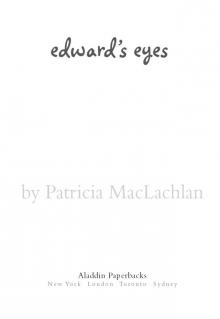 Edward's Eyes
Edward's Eyes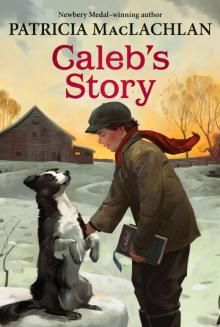 Caleb's Story
Caleb's Story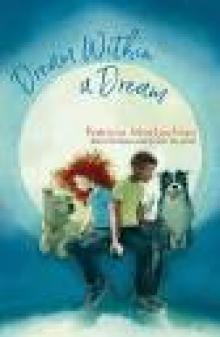 Dream Within a Dream
Dream Within a Dream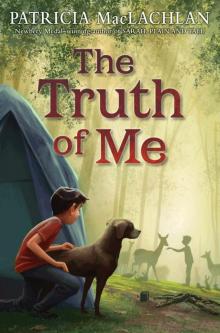 The Truth of Me
The Truth of Me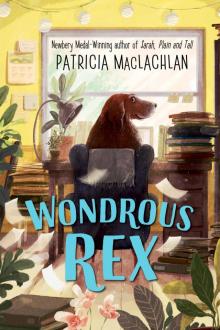 Wondrous Rex
Wondrous Rex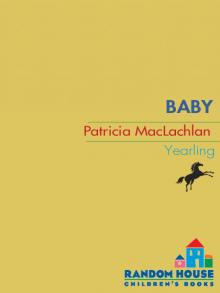 Baby
Baby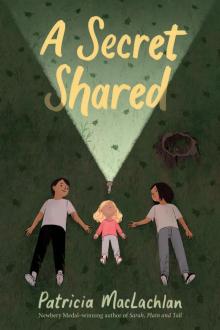 A Secret Shared
A Secret Shared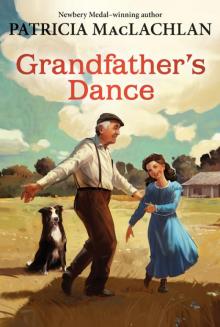 Grandfather's Dance
Grandfather's Dance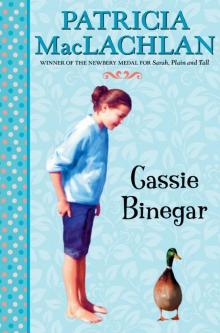 Cassie Binegar
Cassie Binegar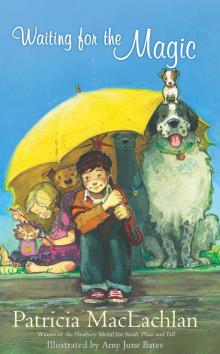 Waiting for the Magic
Waiting for the Magic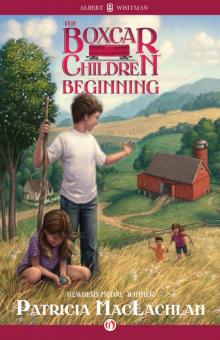 The Boxcar Children Beginning
The Boxcar Children Beginning My Father's Words
My Father's Words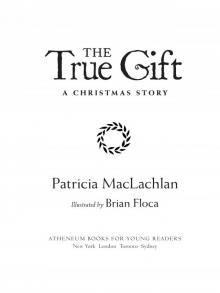 The True Gift
The True Gift